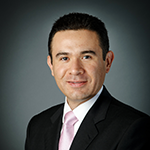Eric Tapia isn’t crazy. However, it’s easy to see why some might think he is: after 10 years at a Big Four accounting firm, he decided to resign in 2010—mere months after finally making partner. “I decided to make the plunge from the Big Four external audit world to the corporate world,” says Tapia, who was an audit partner at KPMG before his current position as vice president of internal audit at W. W. Grainger, the Chicago-based industrial supply company famous for its catalog of more than a million maintenance, repair, and operations products and parts. “It was a big move, but it was a chance to be part of building something new, instead of just maintaining something somebody else built.”
Of course, Grainger—founded in 1927—isn’t new at all. What is new is its renewed focus to expand internationally to better serve its growing base of global customers.
“When I saw where Grainger was then, and where it wanted to be in the next 3, 5, and 10 years, it really sparked my interest,” Tapia says. “Grainger was mainly a North America-centric operation, but it was very vocal about growing globally. I’ve always had an interest in working internationally, so that really excited me.”
In fact, Tapia was the perfect person for the job. Born and raised in Puerto Rico, he’d always had a worldly sensibility. That’s why he joined KPMG in the first place. “KPMG is an international firm, and that international exposure is what attracted me to the firm,” he says.
KPMG offers employees who want it the chance to do an international rotation abroad at one of its 87 global offices. At the advice of a mentor, Tapia waited until he was in management to request his rotation, knowing he’d develop more skills abroad at the senior level than he would at the junior level. When the time came in 2007, Tapia—who’d just completed an MBA at Duke University—had four rotations to choose from: Seoul, London, Singapore, and Santiago.
“My first language is Spanish, and Latin America as a continental economy was doing pretty well, despite the financial crisis; that made Chile seem like the best option,” says Tapia, who worked in KPMG’s Santiago office from 2007 until his departure from the company in 2010.
Tapia made the right choice, as his experience in Santiago is what ultimately attracted Grainger: as the company prepared for international expansion, it was looking for someone with exactly Tapia’s skill set—Big Four accounting experience paired with an international business mind-set. Likewise, Grainger was a perfect fit for Tapia, who was anxious to evolve from providing a business service to being a business partner. “Accounting is all retrospective,” he says. “Whatever happens in a business financially, you account for it. So by the time an accountant looks at something, the businessperson who made the decision already is thinking about other things. I was interested in having a more strategic role.”
That’s precisely the kind of role Tapia has at Grainger, where he’s not only taken over the company’s internal audit function, but completely redefined it. “When they think about audit, people think ‘compliance’—and in some companies, that’s still the role audit plays,” Tapia says. “At Grainger, we’ve been shifting the value of audit from compliance to helping the business better manage risk.”
Indeed, audit in most companies historically has been a reactive business function: when hiccups happen, accountants and auditors swarm in to check executives’ work to ensure they’re dotting i’s and crossing t’s. At Grainger, however, Tapia has worked hard to establish relationships with senior executives so they include him in business conversations before risks happen, instead of after. The result is a strategic dialogue about risk management and prevention instead of a fire drill that’s focused on risk recovery.
“Our value isn’t just compliance; it’s helping people sleep better at night knowing they’ve got the right strategy and the right plan to deploy it,” explains Tapia, who’s earned his seat at the table by doing two things: refusing to audit policies that lack purpose—if a policy doesn’t add value, he says, he won’t audit it—and hiring a more strategic team.
In fact, in the last three years, Tapia has nearly doubled the size of the audit department from approximately 16 people to 31. “The rationale behind that is twofold,” he says. “One, certainly, is that the business has gotten more complex. Grainger has gone from being in 8 countries in 2010 to being in more than 26 today. The second factor has been my effort to shift the value audit brings to the table, and that’s required hiring the right people.”
The right people, it turns out, are those who want to work in the business rather than on the business. “People used to come to audit and stay in audit; now, they see audit as an entry to the rest of the business,” says Tapia, who has transitioned 20 auditors in the last three years to other parts of Grainger, including not only other finance functions but e-commerce, customer service, and even sales. “Mobility of talent has helped attract more and better talent.”
A point of pride for Tapia—who is president of Grainger’s Latino Business Resource Group—is the fact that a growing portion of that talent is Latino. “Like many other Midwest companies, Grainger has struggled somewhat to attract a lot of Latino talent,” he says. “That’s changing with time as I help them think differently about targeting talent, developing talent, and retaining talent.”
And he’s teaching Grainger to think differently about Latino customers, too. “I’m working with our sales and marketing organization in the United States to define, ‘What is the Latino business opportunity?’” Tapia says. “Hiring Spanish-speaking employees is not the right solution. The right solution is hiring sales associates who have a real cultural connection.”
Tapia’s ideas might sound crazy, but then again, so does pursuing new markets after nearly a century in mostly one. “Strategic risk thinking is critical for the success of any business,” he says. “In an economy that is changing very quickly and is fast becoming more global and competitive, not taking risks is always the worst option. Unfortunately, for too long we have ceded the definition of risk to financiers, who see the purpose of risk management as removing risk. Successful businesses need a more complete vision of risk management, where they consider not only how to protect themselves against some risks, but also which risks to exploit and how to exploit them.”

